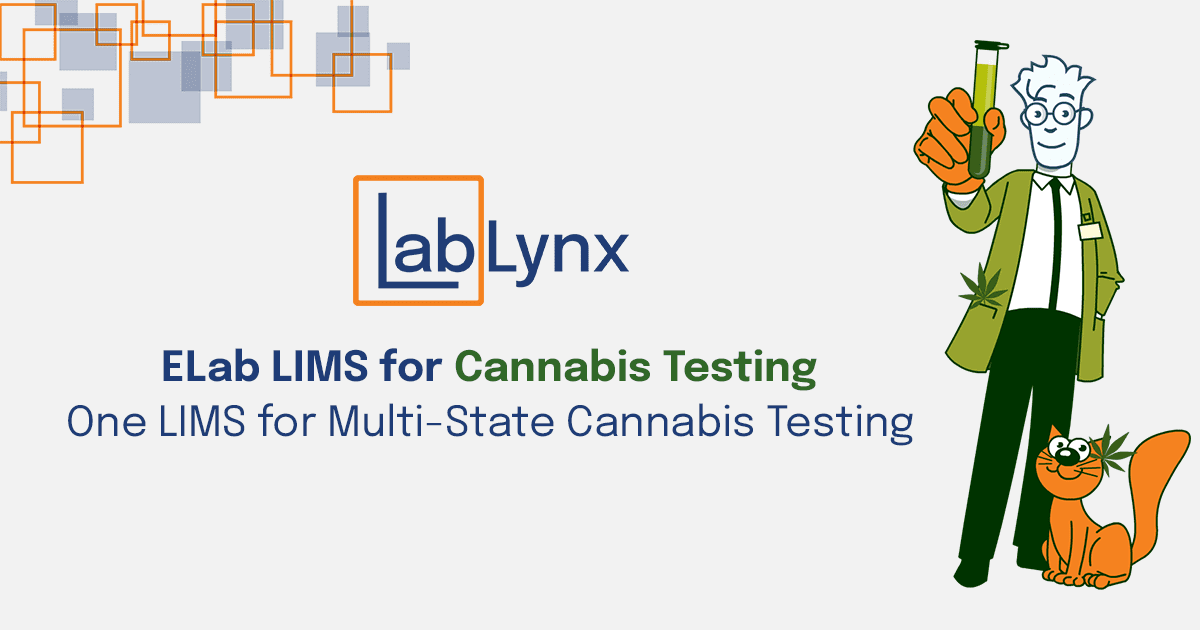ELab for Cannabis: One LIMS for Multi-State Cannabis Testing

The fragmentation of cannabis regulations poses a particular challenge for multi-state cannabis testing labs. Although the industry and state regulators are trying to align requirements and standards, testing labs still lose many of the benefits of multi-state operations. CannaQA is a laboratory information management system (LIMS) that can help multi-state laboratories navigate the complexities of cannabis testing.
Fractured States of Cannabis Testing
Life could be much easier for cannabis testing labs. The food and pharmaceutical industries benefit from the nationwide consistency federal regulators provide. EPA, FDA, and other federal agencies set clear criteria for what substances may be present, in what concentrations, and which methods labs should use. Cannabis testing labs will see none of this until cannabis is de-scheduled from the Controlled Substances Act.
Without consistent federal oversight, laboratories must navigate a patchwork of local, state, and tribal regulations; licensing processes vary; accreditation requirements are different; and regulatory guidance for methodologies, quality control and other lab practices can be vague or non-existent.
If laboratories could simply copy processes from the food and pharmaceutical industries, then the situation would be manageable. But cannabis is different. The matrices are more complex. Cannabis products may be inhaled, ingested or topical. Potency is not just a factor of THC concentration but the complex and under-researched synergy among dozens of cannabinoids, terpenes, and other compounds. Pesticide concentrations that are safe for food crops may be dangerous for inhalable cannabis products.
Building National Standards Without Federal Help 
The industry is bringing some consistency to the practice of cannabis testing. Already ISO/IEC 17025 is emerging as a common baseline accreditation requirement or at least a standard in many states and internationally. In addition to developing standard methods and setting research priorities, AOAC International is considering how to expand its Laboratory Proficiency Testing Program to the cannabis industry. And ASTM International’s cannabis committee published ASTM D8282-19, a standard for cannabis laboratory test method development and validation.
“[D8282] fills the current gap in the cannabis testing industry with best practice guidance on how to establish test methods that will ensure consistency of results from lab to lab,” committee member David Vaillencourt explained.
State regulators are just as frustrated with the situation. The cannabis regulators of nineteen states formed the Cannabis Regulators Association (CANNRA) to share and harmonize best practices across their jurisdictions. Recognizing that federal support is needed, CANNRA sent an open letter to Congress highlighting important policy areas that need to be addressed with the alignment of cannabis testing featured prominently.
“Each state differs in how testing laboratories fit within unique markets, how they are licensed or accredited, and who is responsible for the regulation of their operations… [these differences] make regulating this emerging industry challenging. Alignment of laboratory testing standards across jurisdictions would serve to protect consumers.”
Managing Multi-State Cannabis Operations
The rise of multi-state cannabis operations was inevitable once cannabis legalization gained momentum. It is a positive aspect of a maturing industry. Economies of scale make multi-state operators more efficient and resilient in a fast-moving market. Multi-state laboratories can standardize processes, infrastructure, suppliers, and training across the company to continually improve their services. Centralization may the only way to offer certain testing services at all.
Yet multi-state cannabis testing labs cannot fully realize these benefits. Each lab in each state must comply with different regulations, test for different compounds, use different methods and meet different accreditation requirements. Prohibitions on interstate cannabis transport prevent these companies from economically offering a full range of testing services.
In effect, multi-state cannabis testing companies operate as a collection of independent labs. Occupying a halfway point, they lose the agility of true independence without gaining the synergies of interstate operations.
ELab LIMS for Cannabis Testing Unites Multi-State Cannabis Labs
ELab LIMS for Cannabis Testing from LabLynx, Inc. is a LIMS solution tailored for the needs of cannabis testing labs – from small single labs to multi-state or even global enterprises. Designed to support labs serving every aspect of the cannabis supply chain, ELab for Cannabis offers features that bring much-needed consistency to multi-state operations.

Accessibility – The laboratory information management system at the heart of ELab for Cannabis is a secure, cloud-hosted database for all sample, customer, and testing data. Your employees can access their ELab LIMS for Cannabis Testing accounts 24×7 from any lab or when working remotely. Yet its unique design means locations can operate as separate entities, with multiple departments within each, allowing access only to their staff and select management, and allowing only appropriate samples to be accepted and processed. But scalability is rapid and easy, supporting efficient and effective expansion as additional regions open new opportunities.
 Configurability – Each location can configure the tests, processes and limit sets needed to serve their local markets. Reports of test results can be modified for each customer as well as the specific requirements of each regulator. While each location can respond to their local conditions, ELab for Cannabis lets the company manage laboratory processes through a single, coordinated system.
Configurability – Each location can configure the tests, processes and limit sets needed to serve their local markets. Reports of test results can be modified for each customer as well as the specific requirements of each regulator. While each location can respond to their local conditions, ELab for Cannabis lets the company manage laboratory processes through a single, coordinated system.
 Oversight and Compliance – A centrally-managed, locally-relevant informatics solution makes it easier to document laboratory practices and maintain quality control. Integrating instrument and inventory management gives you visibility into the state of each lab. And centralizing your laboratory data management through ELab LIMS for Cannabis Testing facilitates compliance and accreditation efforts in multiple states.
Oversight and Compliance – A centrally-managed, locally-relevant informatics solution makes it easier to document laboratory practices and maintain quality control. Integrating instrument and inventory management gives you visibility into the state of each lab. And centralizing your laboratory data management through ELab LIMS for Cannabis Testing facilitates compliance and accreditation efforts in multiple states.

Scalability – Your laboratory may provide cannabis testing services in two states or twenty, serve one kind of stakeholder or the entire supply chain, focus on potency testing or offer a full suite of services. ELab for Cannabis scales to support your business model today and into the future.
Find out more about how ELab LIMS for Cannabis Testing can improve your multi-state cannabis operations and arrange for a demonstration by clicking here or contacting LabLynx at sales@lablynx.com or 866-LABLYNX (522-5969).
References:
“Medical Cannabis Poses Unique Testing Challenges”, Genetic Engineering & Biotechnology News.
“Cannabis testing is an exact science – regulations are not”, Food Engineering.
“Variation in Cannabis Testing Challenges a Young Industry”, The Scientist.
“Cannabis program new working group examining potential role for AOAC in proficiency testing”, AOAC International.
“ASTM D8282-19 Standard Practice for Laboratory Test Method Validation and Method Development”, ASTM International.
“Lab Testing Standard Published by ASTM International Cannabis Committee”, ASTM International.
“CANNRA Issues Letter to Congress Highlighting Regulatory Issues Which Impact State and Federal Prioritie”, Cannabis Regulators Association.
“Is Your Cannabis Testing Laboratory Ready for ISO/IEC 17025:2017?”, Cannabis Science Tech.















